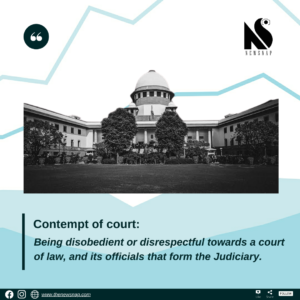
In recent times, one of the pieces of news that has been raging is the contempt of court case against the Senior Supreme Court of India advocate, Prashant Bhushan. This is by far the most grappling piece of news from the judiciary, so far since the start of 2020.
An overview of the case- On the 2nd of July 2020, Mahek Maheshwari, a 29-year old lawyer filed a petition against Senior Supreme Court advocate Prashant Bhushan and Twitter India in the Supreme Court, requesting the court to take action against 2 tweets posted by Mr. Bhushan and initiate contempt proceedings. Mr. Maheshwari, the petitioner was represented by Senior Advocate Anuj Saxena. After this, the court, which was a 3- Judge Bench comprising of Justices Arun Mishra, BG Gavai and Krishna Murari took Suo Moto cognizance of the 2 tweets, and subsequently a notice was sent to Mr. Bhushan, who was represented by Senior Advoate Dushyant Dave, and Twitter India was represented by Senior Advocate Sajjan Poovayya.
So, what exactly is the meaning of the term “contempt”? In simple terms, “contempt” means being disobedient or disrespectful towards a court of law, and its officials that form the Judiciary. This offence includes any form of behaviour that opposes and/or defies the justice, authority and dignity of the court. This action is broadly defined in two types-
In India, the laws governing the contempt offences are the Contempt of Courts Act, 1971. According to the act, the Supreme Court of India and all the High Courts are vested with powers to try and punish the offences of contempt. Moreover, High Courts have the power to try and punish acts of contempt against courts that are subordinate to them, such as Trial Courts, Magistrates, Family Courts, District Courts, and Forums. Furthermore, the Supreme Court has clarified that any court can try and punish cases of contempt.
The Contempt of Courts Act, 1971 classifies contempt into two main types:
However, if any publication of or about the court is made out of innocence, or with reasonable criticism, then it does not constitute contempt.
In reality, the Contempt Laws and the Contempt of Courts Act has been misused by the courts, due to its loopholes and vague interpretation in some sections. The laws have been used to prevent dissent from anybody in any form whatsoever, regardless of whether the criticism is true or not. One of India’s most famous Judges, Justice V R Krishna Iyer has also been charged with the Contempt of Court in the Kerala High Court for his remarks “Our whole Judicial Approach has a certain independence from all civilised behaviour…” Although the act has been amended a few times in the past, the act still requires inspection and improvements in order to limit the misuse of its power by the courts.
Melukote - Vairamudi Festival 2022. Latest Photos and Videos of Lord Cheluvanarayanaswamy. Video Footage of… Read More
The Bengaluru Metro Rail Corporation (BMRCL) revealed that Namma Metro will be functional from 7… Read More
India has appealed the EU member states to distinctly consider extending exemption for those who… Read More
Prime Minister Narendra Modi will address several beneficiaries of the Digital India initiative on the… Read More
Private hospitals in the country will no longer be able to obtain the Covid-19 vaccines… Read More
The Directorate General of Civil Aviation (DGCA) took the call for further extending the ban… Read More
This website uses cookies.
Leave a Comment